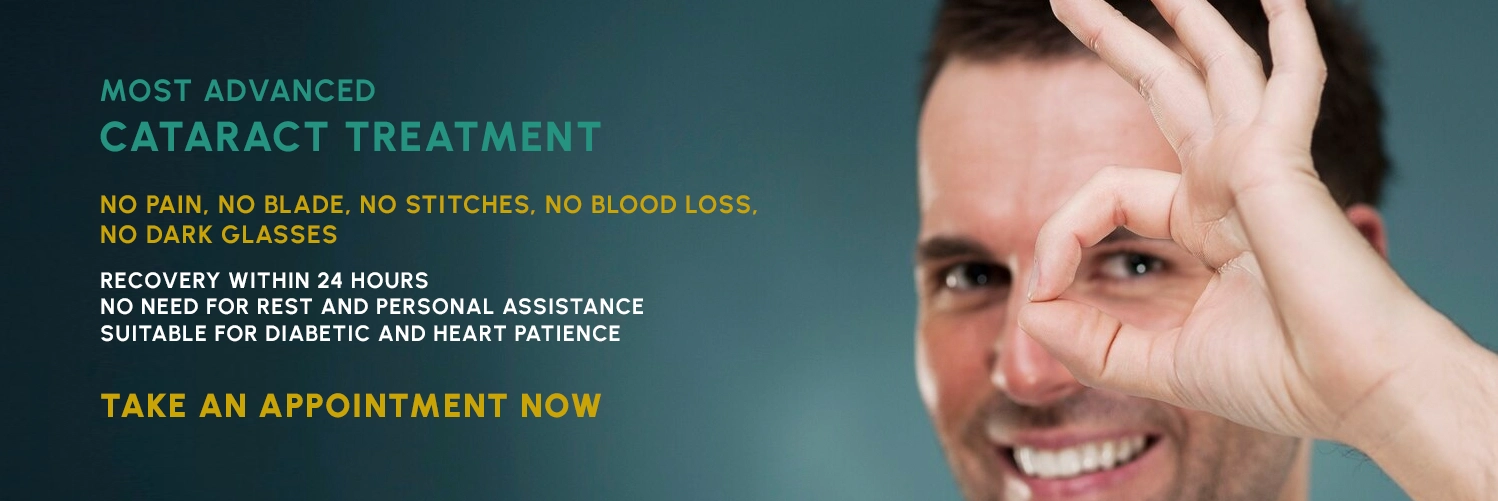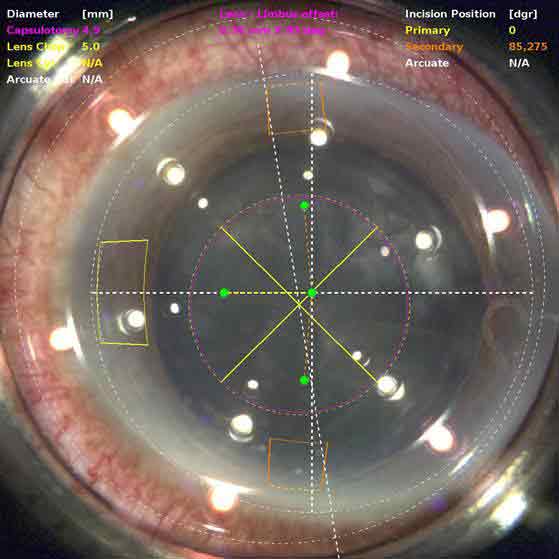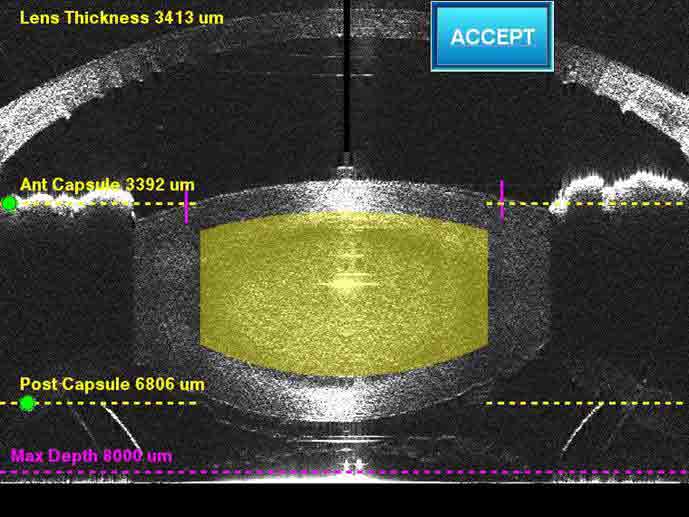Treatments

Laser Cataract Surgery (Blade-free)
Perfection like never before
In Laser Cataract Surgery, major steps of cataract surgery are done with a computer controlled, highly efficient and Sophisticated Laser called FEMTOSECOND LASER.
The Femtosecond Laser is the safest, most precise and most tissue friendly laser ever.
The most complication prone steps of cataract surgery are taken over by this Laser. So, we can assure perfection to all our patients in these steps of cataract surgery: -
- Capsulotomy - The technique in which a small circular opening is made on the covering of the cataract affected Lens.
- Lens Fragmentation - The technique in which the cataract is made into smaller pieces so that it is easily removed by suction.
- Incisions - Removes a blade totally! The laser makes precise tracks through which the cataract is removed and an Intra Ocular Lens is implanted.
- Astigmatism Correction - The Precise Femtosecond Laser can make accurate treatment profiles for persons with astigmatism so that our surgeons can remove the cataract and also the astigmatism.
- Bio-Optics - With Femtosecond technology, it is now possible to enhance vision even many months after cataract surgery in the rare event that some glass power remains.
- Customizable - Implantation of a Restor Lens is possible so that the patient can be free of reading glasses for up to 90% of all normal tasks.
Mulamoottil Eye Hospital uses one of the best technologies available in the world for LASER CATARACT SURGERY.
We use the LENSX Femtosecond LASER CATARACT SURGERY system made by Alcon, USA for the surgery and the patients require only 24 hours for post-surgical recovery.
Unlike conventional surgical methods, the procedure mentioned above involves no blood loss, no stitch and is totally painless. It is the most ideal one for diabetic, cardiac, hemophilic, cancer and Asthma patients.
Unique Benefits
- Precise
- Safe
- Predictable
- Totally Blade-free
- Astigmatism Correction
- Fully Automated with supervisory control of the Surgeon
- BIO-OPTICS enables glass power correction even months after surgery
- Wide choice of quality lenses and solutions
- Laser Cataract Surgery is Customizable
Other Patient Benefits
- Least Chance of Infections or other complication
- Eliminates most of the common surgical errors
- No need to stop anti-coagulant therapy (Aspirin, etc)
- Painless surgical procedure
- Excellent visual regain at a fast pace
- Infections are rare as incision size is small and seals early
- Safe for cardiac patients
- Safe for diabetic patients
- NIL bleeding as it is Blade-Free
- No use of pads
- Patient can do normal routine work from next day of the surgery:
- Take head bath
- Drive an automobile
- Watch TV or read without restriction
- Carry shopping bags or moderate weights
- Cook as usual, attend religious and social functions
- No need for wearing dark glasses
Why Us?
At Mulamoottil Eye Hospital, we perform the Blade-free Laser Cataract Surgery which is the safest, precise and accurate cataract treatment available in the world today.
At present, we are the pioeersin Kerala offering this most-modern surgery (since 2012).
Also, we offer this surgery at the lowest possible rate in the world with our famed exceptional quality of service.
FAQ
Any person with cataract can undergo Laser Cataract Surgery provided that the cataract has not matured and become very hard.
Laser Cataract Surgery procedure is extremely safe for cardiac and diabetic patients. Also, for apprehensive persons, patients with Asthma, Hemophilia, etc
The total procedure time for Laser Cataract Surgery is roughly 9-15 minutes. Usually around 10 minutes.
The cost is usually in a range of 60,000 to 80,000depending on the materials you choose.
No. Not at all!
Generally, patients are aware of the surgeon touching the eye and a vague sensation of something being done, but pain is not reported.
At Mulamoottil Eye Hospital, we do not use sedatives and we find that our patients are very satisfied with the lack of pain. We usually do not give injections around the eye.
At Mulamoottil Eye Hospital, we bandage the eye for 2 hours (the time taken for the Laser tracks to seal).
At the end of 2 hours, our surgeons remove the protective bandage and examine the eye in detail. Then the patient is issued clear protective goggles (not conventional dark glasses) that they can use for a few days. An eye shield will be issued for night use (to prevent inadvertent massaging or trauma to the operated eye).
Mulamoottil Eye Hospital encourages patients to leave for their homes 4 hours after the surgery.
Complications with Laser Cataract Surgery are rare.
However, like all surgeries, Laser Cataract Surgery too has possible complications, though at very low rates. These are: Infections (endophthalmitis), inflammation, posterior capsule opacification (PCO), vitreous prolapse, retinal detachment, cystoid macular edema (CME), etc. However, it must be stated that these are mostly reported for ordinary cataract surgeries and the occurrence is very minimal in Laser Cataract Surgery.
Patients are advised to review with our surgical team after 48 hours. The second visit is scheduled after 10 days. Thereafter, there is no real need for follow up visits, though we do encourage our patients to see us after 60 days (prior to stopping eye drops).
There are no rigid restrictions after Laser Cataract Surgery, but it is wise to avoid rubbing the operated eye and direct rinsing of the eye with water.
Most patients can go to work after a day. Almost all patients can take head bath, drive a car, go shopping, worship, cook and do routine household chores.
Watching TV or reading is not a restriction. Using computer too is OK. There is no restriction on speaking or eating any kind of food.
Preferably, the day after. Within a month, at the very least.
Both eyes are not usually operated on the same day because of the simple reason that if there is a remote chance of any infection to one eye, both eyes will be affected.
We feel it is not worth the risk, however small it is.

